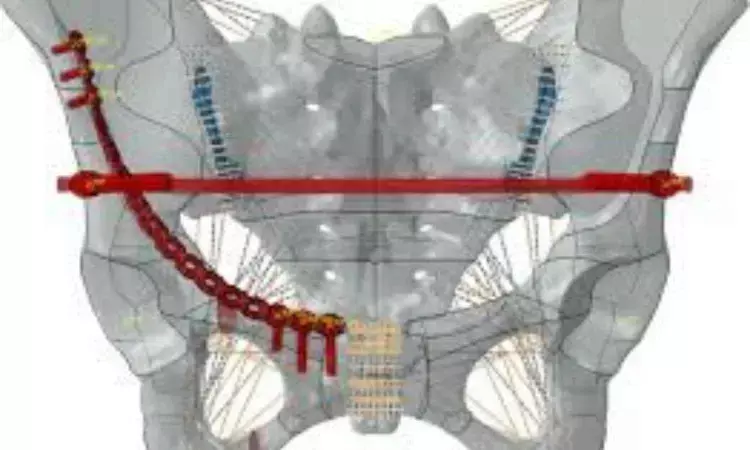- Home
- Medical news & Guidelines
- Anesthesiology
- Cardiology and CTVS
- Critical Care
- Dentistry
- Dermatology
- Diabetes and Endocrinology
- ENT
- Gastroenterology
- Medicine
- Nephrology
- Neurology
- Obstretics-Gynaecology
- Oncology
- Ophthalmology
- Orthopaedics
- Pediatrics-Neonatology
- Psychiatry
- Pulmonology
- Radiology
- Surgery
- Urology
- Laboratory Medicine
- Diet
- Nursing
- Paramedical
- Physiotherapy
- Health news
- Fact Check
- Bone Health Fact Check
- Brain Health Fact Check
- Cancer Related Fact Check
- Child Care Fact Check
- Dental and oral health fact check
- Diabetes and metabolic health fact check
- Diet and Nutrition Fact Check
- Eye and ENT Care Fact Check
- Fitness fact check
- Gut health fact check
- Heart health fact check
- Kidney health fact check
- Medical education fact check
- Men's health fact check
- Respiratory fact check
- Skin and hair care fact check
- Vaccine and Immunization fact check
- Women's health fact check
- AYUSH
- State News
- Andaman and Nicobar Islands
- Andhra Pradesh
- Arunachal Pradesh
- Assam
- Bihar
- Chandigarh
- Chattisgarh
- Dadra and Nagar Haveli
- Daman and Diu
- Delhi
- Goa
- Gujarat
- Haryana
- Himachal Pradesh
- Jammu & Kashmir
- Jharkhand
- Karnataka
- Kerala
- Ladakh
- Lakshadweep
- Madhya Pradesh
- Maharashtra
- Manipur
- Meghalaya
- Mizoram
- Nagaland
- Odisha
- Puducherry
- Punjab
- Rajasthan
- Sikkim
- Tamil Nadu
- Telangana
- Tripura
- Uttar Pradesh
- Uttrakhand
- West Bengal
- Medical Education
- Industry
Screw-rod system safe,minimally invasive technique for posterior pelvic fracture, suggests study

Screw-rod system safe,minimally invasive technique for posterior pelvic fracture, suggests study published in the BMC Surgery.
Pelvic fractures are often associated with life-threatening damage and mechanical instability. Surgical therapy is a prior choice. To minimize surgical invasion and risk, bilateral screws combined with curved rod were applied to stabilize posterior pelvic ring.
This study was aim to explore the clinical effect of this procedure. From January 2018 to January 2022, 27 patients with posterior pelvic fracture were included retrospectively. There were 12 males and 15 females with an average age of 56.3 ± 14.2 years.
The prognosis of pelvis was evaluated by Matta and Majeed scores. Relevant clinical evaluation indications include the time of fracture healing, limb function and complications. Results: The average follow-up time was 14.2 ± 5.4 month. Matta scoring standard: excellent in 18 cases, good in 7 cases, the good rate was 92.6%.
The average healing time was 8.4 months. The standard of Majeed score in 6 months after operation: excellent in 14 cases, good in 10 cases, the good rate was 88.8%. At the last follow-up, the functional recovery of the affected limb was satisfactory. No deep infection occurred after operation. The neurological symptoms of patients with caudal sacral nerve injury were recovered 6 months after operation. The results indicated that screw-rod system is a safe technique. Minimally invasive technology reduced frequency of fluoroscopy. It provides a simple and safety method for posterior pelvic fracture.
Huang, J., Cheng, J., Shi, B. et al. Modified screw-rod fixation for management of posterior pelvic ring fractures: a retrospective study. BMC Surg 24, 364 (2024). https://doi.org/10.1186/s12893-024-02654-2
Dr. Shravani Dali has completed her BDS from Pravara institute of medical sciences, loni. Following which she extensively worked in the healthcare sector for 2+ years. She has been actively involved in writing blogs in field of health and wellness. Currently she is pursuing her Masters of public health-health administration from Tata institute of social sciences. She can be contacted at editorial@medicaldialogues.in.
Dr Kamal Kant Kohli-MBBS, DTCD- a chest specialist with more than 30 years of practice and a flair for writing clinical articles, Dr Kamal Kant Kohli joined Medical Dialogues as a Chief Editor of Medical News. Besides writing articles, as an editor, he proofreads and verifies all the medical content published on Medical Dialogues including those coming from journals, studies,medical conferences,guidelines etc. Email: drkohli@medicaldialogues.in. Contact no. 011-43720751


